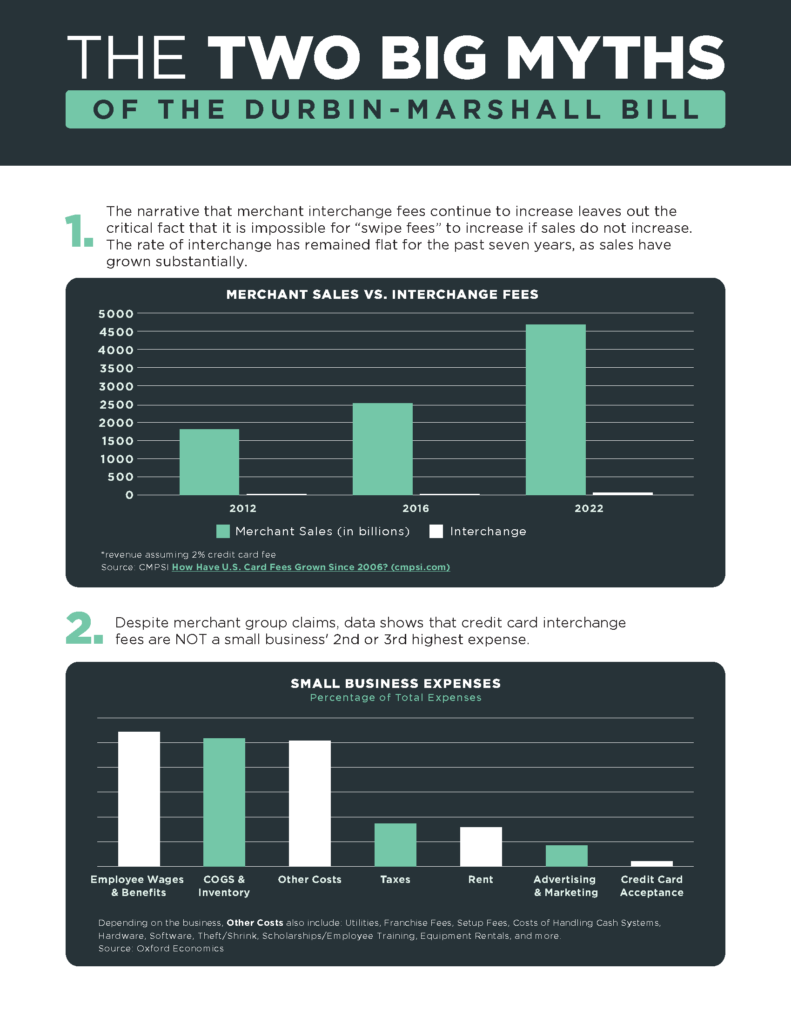Big-box retail organizations and their allies in Congress have proven they will say almost anything to get Congress to give them ANOTHER government handout that transfers billions of dollars to their bottom lines. Copied below is the latest EPC Explainer that debunks the two biggest myths being pushed by retail and merchant lobbying groups about their Big-Box Bill.

Interchange is an essential part of the electronic payments ecosystem that ensures its functionality. On average, interchange is 1-2 percent of a purchase – a percentage which has remained relatively flat over the last seven years – that merchants and retailers pay to process electronic payments. Payment networks and card-issuing banks use interchange to invest back into the payment ecosystem for rewards, card security, innovation, and more. This critical component of electronic payments benefits consumers and merchants alike.
Further, credit cards in many cases make more economic sense than cash. A retail advisory firm found costs associated with handling cash can vary from nearly 5 percent to more than 15 percent.
Click HERE to access a printer-friendly version of the EPC explainer.
In addition to the myths, discussed above, proponents of the Durbin-Marshall bill have also been misleading about several other aspects of the legislation.
Consumer Savings
Following similar legislation introduced by Senator Durbin to cap interchange on debit cards, where retailers and politicians said consumers would end up saving money, a Richmond Fed study shows 98 percent of retailers either failed to reduce prices or actually raised them the last time interchange was regulated (77.2% stayed the same, 21.6% increased).
A 2013 report from the University of Chicago estimated the financial impact of the first Durbin Amendment on consumers to be anywhere between $22-25 billion over the regulation’s lifetime.
Retailers have even admitted they do not lower prices when costs go down. This summer Jeff Lenard, a vice president at the National Association of Convenience Stores, told Yahoo Finance that “retailers tend to hold back price increases, but when prices decline, they tend to hold back decreases and gain margin.”
Small Banks Will See Price Increases
According to a recent study from PPI, “credit cards represent a higher level of liability for banks, smaller [banks] who are less equipped to take on higher risk prefer to use networks that have made higher investments in security measures … the Durbin Amendment, by shifting the responsibility of network choice, strips the bank from being able to select the most secure network while retaining most of the liability.”
Local Economies Would Suffer
An Airlines For America study examining cobranded airline cards, which are held by approximately 30 million Americans, generate $23 billion in domestic economic activity due to the 15 million trips Americans make using loyalty points.
Cyber & Data Security
Financial services companies bear the cost of fraud to ensure that consumers can be confident using credit cards. They also spend billions of dollars each year to bolster cybersecurity, leading to technological advancements like tap-to-pay and contactless payments. But under this bill, providers wouldn’t have the interchange revenue to invest in the protections and innovations that cardholders deserve. Additionally, the bill has a hollow carve-out for foreign networks like China UnionPay, which won’t stop American consumer’s transaction information from being routed through less secure foreign countries
PPI also reported “Due to the heightened risk, banks and financial firms have invested considerable sums in data security. However, under the Durbin Amendment, routing decisions are shifted from banks and consumers to merchants, leaving the level of network security variable among any number of merchants. Unfortunately, many merchants have not adequately invested in data security resulting a number of serious data breaches,” including Target, Home Depot and Wawa.
Credit Card Rewards
Not only would this policy rob consumers of their network choice, but it would eliminate funding for credit card rewards programs and cashback options that American families rely on. In 2020, U.S. card rewards programs returned roughly $60 billion to consumers of all income levels, helping working class families pay for groceries and back to school shopping. Credit card routing mandates would effectively eliminate credit card rewards as we know it.
A PPI study found “low-income individuals use rewards credit cards at a rate similar to high-income individuals” and “there is substantial evidence that caps placed on credit card transactions reduces rewards offered to consumers while increasing the cost of holding a card, ensuring consumers across income levels are left worse off.”